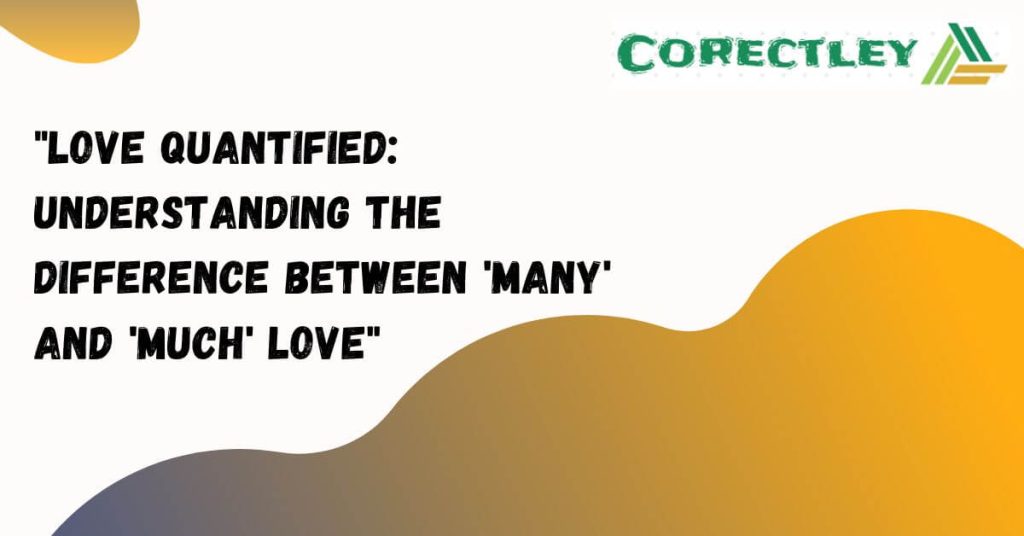Love is perhaps one of the most impressive and complex, yet convincing feelings that persons experience, learn, and try and instruct about.
Be that as it may, concerning communicating love; The English language provides a variety of options, including Many Love” and “Much Love.”
You may have come across these expressions and are considering what they mean or, more specifically, the most effective ways to use them. However they might sound comparative, there are tremendous contrasts between the two.
In this article, we will investigate the principal distinctions between “Many Love” and “Much Love”, and perpetually different conversations lining around both of them.

Many Love or Much Love: What’re the Differences?
Several incongruities exist between these two expressions, even though they appear to be resolving a comparable issue; the issue of adoration and how to communicate it.
I’ll go over five major differences between “Many Love” and “Much Love” in the following paragraphs.
Essentially, these distinctions cut across different points, viewpoints, and similarly context-oriented uses. A summary of these differences is provided below.
1. Plurality
The main distinction between “Many Love” and “Much Love” lies in their linguistic structure. ” Many Love” is in the plural structure, while “Much Love” is particular.
For this situation, the plural structure underlines the number of persons or things, while the particular structure accentuates the solidarity or peculiarity of the idea.
2. Grammatical Role
“Many Love” is much of the time utilized in relaxed environments, for example, in easygoing discussions or virtual entertainment posts.
Then again, “Much Love” is more formal and frequently utilized in additional serious or proficient settings, for example, in business messages, formal letters, or scholarly composition.
This is where the situation of logical use becomes possibly the most important factor; as the syntactic job of both of these expressions frames the bedrock for its utilization in some random setting.
3. Countable vs. Uncountable Nouns
The type of nouns they modify is the first and most significant distinction between “Many Love” and “Much Love.” Many” is utilized with countable things, while “much” is utilized with uncountable things.
For instance, “many friends” or “many chocolates” but “much joy” or “much happiness” Since “adoration” is an uncountable thing, “Much Love” is the right utilization, while “Many Love” would be inaccurate.
4. Cultural Connotations
At long last, the decision between “Many Love” and “Much Love” may likewise rely upon social implications. In certain societies, like in the US, “Much Love” is viewed as a more customary and formal approach to communicating friendship.
In different societies, like in Latin America, “Much Love” might be viewed as excessively formal, and “Much love” is liked to nonchalantly communicate warmth and fondness more.
5. Quantity vs Intensity
One more significant distinction between “Many Love” and “Much Love” is the emphasis on amount versus power. ” “Much Love” emphasizes the depth and intensity of the emotion, while “Many Love” suggests a large number of people who love.
As such, “Many Love” alludes to a large number of persons who feel love, while “Much Love” alludes to the strength and profundity of the actual affection.
What Does Much Love Mean?
Much Love is an expression that is utilized primarily to communicate love to somebody who’s exceptionally cherished, or regarded by somebody or a gathering of people.
It means that the person being referred to has a social charisma that makes them popular, including you, if you use the phrase.
We’ve proactively laid out that in the statement of adoration, “Much Love” assumes a colossal part as an expressional expression. However, it has a specific meaning, making it unusual when used in the right context.
Also, the above importance clears all hurricanes you might’ve had before perusing this post.
What Does Many Love Mean?
Much Love is an articulation that is used fundamentally to impart love to someone who’s uncommonly treasured, or respected by someone or a social event of persons.
If you use the phrase, it indicates that the person being referred to has a social charisma that makes them popular, including you.
We’ve proactively spread out that in the explanation of veneration, “Much Love” expects a monster part as an expressional articulation. Nonetheless, it has a particular importance, making it uncommon when utilized in the right setting.
Likewise, the above significance clears all storms you might’ve had preceding scrutinizing this post.
How Do You Use “Much Love?”

The casualness encompassing the utilization of “Much Love” makes it a clashing expression, even though it tends to be utilized in various regards. While utilizing “Much Love”, you need to give close consideration to the way that it is a relaxed hello and ought to be treated thusly.
The casual term of adoration “Much Love” is now and again used to convey sensations of warmth or worry for somebody.
While saying goodbye to a companion or relative, offering consolation to somebody who is battling, or offering thanks to somebody who has helped you here and there, among different conditions, it tends to be used.
Here are a portion of the models as utilized in the sentence:
- ‘I’m happy you didn’t let me cry be; Much Love’
- ‘Much Love to you dear, you’re quite possibly one of the most extraordinary ones
- ‘Your show was heavenly, Much Love to you for being uncommon’
When Can You Use “Much Love”?
“Much Love” can only be used to show genuine concern or affection for someone. It is especially a decent approach to conveying how you feel about somebody without being excessively high over your head, but then actually keeping a specific degree of prudence.
This expression ought not be utilized in that frame of mind as there are propensities that you’re not very familiar with the person at the less than desirable end; in any event, not alright to say you love them.
Having said that, you can use “Much Love” for your family, close friends, allies, high school friends, and many other people.
In a full sentence, “Much Love” can act as a proper method of communicating adoration, whether it is expressed orally or utilized in a composed configuration, as in letters or some other composed medium.
Final Note
The purpose of distinguishing between “Much Love” and “Many Love” is to prevent the erroneous use and application of contradictory contextual terms.
Through this article, I’ve had the option to draw convincing incongruities between these two expressions and I’m hopeful that my piece will assist you with knowing how and when to utilize these expressions.